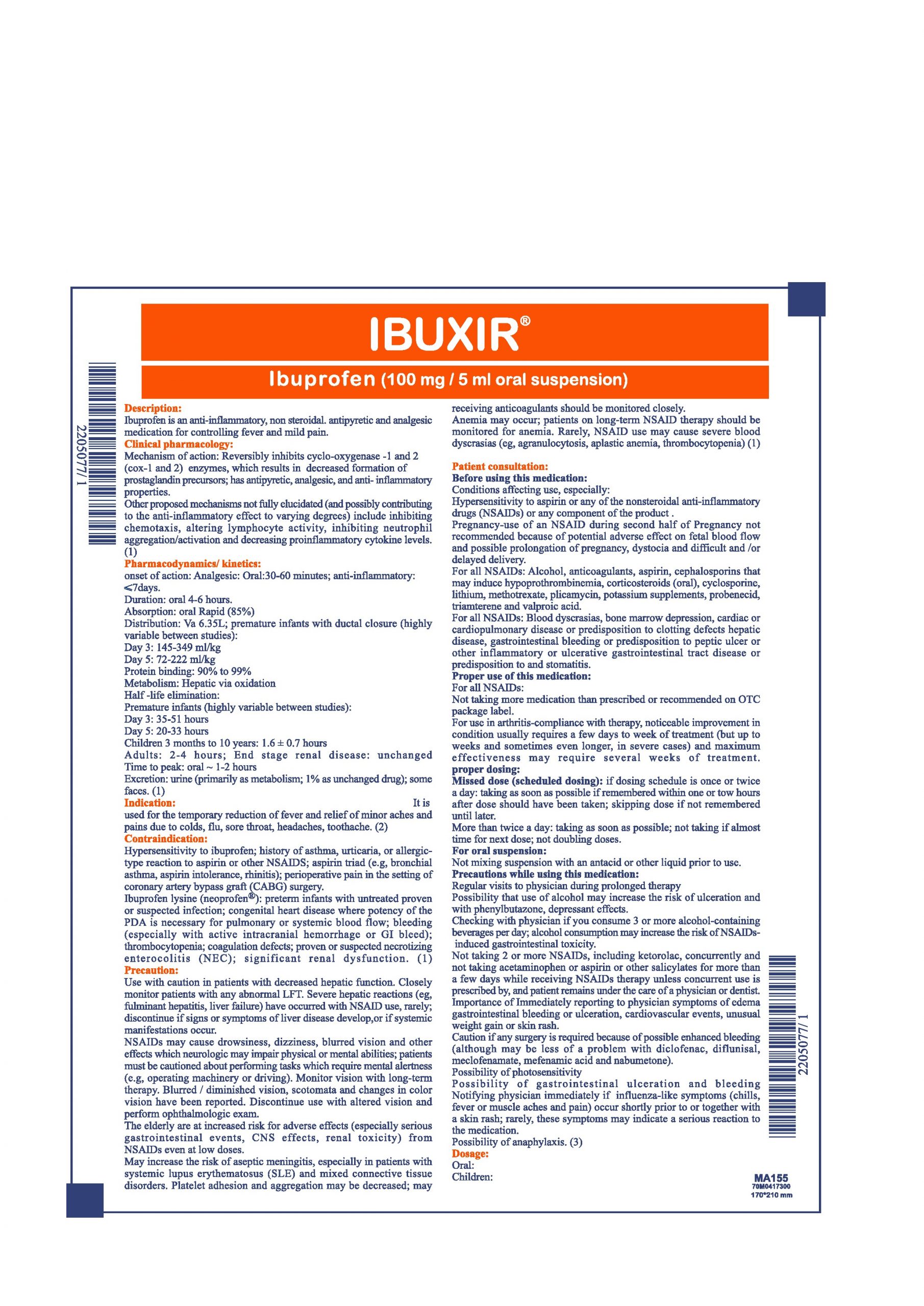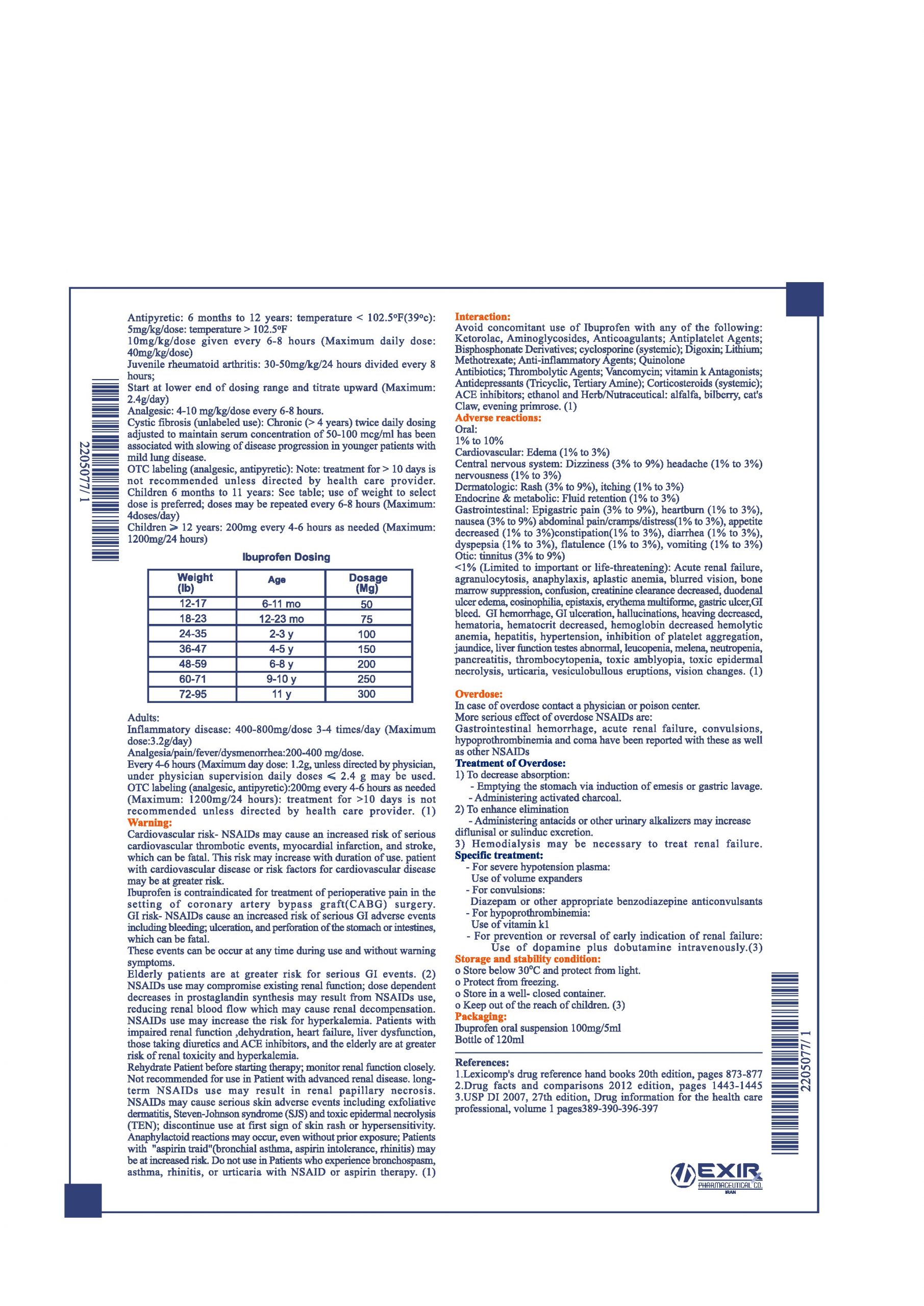IBUXIR
oral suspension Ibuprofen 100mg/5ml

| Generic Name of Product | Brand Name | Dosage Form | Strength | Pharmacologic Group | Therapeutic Group | Unit Per Pack |
| Ibuprofen | Ibuxir® | Suspension | 100 mg/5ml | NSAIDs | Analgesics | 1 |
Indications And Usage | In Pediatric Patients: For reduction of fever in patients aged 6 months up to 2 years of age. For relief of mild to moderate pain in patients aged 6 months up to 2 years of age. For relief of signs and symptoms of juvenile arthritis. In Adults: For treatment of primary dysmenorrhea. For relief of the signs and symptoms of rheumatoid arthritis and osteoarthritis. Since there have been no controlled trials to demonstrate whether there is any beneficial effect or harmful interaction with the use of ibuprofen in conjunction with aspirin, the combination cannot be recommended. |
Administration | PEDIATRIC PATIENTS: Fever Reduction: For reduction of fever in children, 6 months up to 2 years of age, the dosage should be adjusted on the basis of the initial temperature. The recommended dose is 5 mg/kg if the baseline temperature is less than 102.5ºF, or 10 mg/kg if the baseline temperature is 102.5ºF or greater. The duration of fever reduction is generally 6 to 8 hours. The recommended maximum daily dose is 40 mg/kg. Analgesia: For relief of mild to moderate pain in children 6 months up to 2 years of age, the recommended dosage is 10 mg/kg, every 6 to 8 hours. The recommended maximum daily dose is 40 mg/kg. Doses should be given so as not to disturb the child's sleep pattern. Juvenile Arthritis: The recommended dose is 30 to 40 mg/kg/day divided into three to four doses (see Individualization of Dosage). Patients with milder disease may be adequately treated with 20 mg/kg/day. ADULTS: Primary Dysmenorrhea: For the treatment of primary dysmenorrhea, beginning with the earliest onset of such pain, Ibuxir should be given in a dose of 400 mg every 4 hours, as necessary, for the relief of pain. Rheumatoid Arthritis and Osteoarthritis: Suggested dosage: 1200-3200 mg daily (300 mg q.i.d. or 400 mg, 600 mg or 800 mg t.i.d. or q.i.d.). Individual patients may show a better response to 3200 mg daily, as compared with 2400 mg Individualization of Dosage: The dose of Ibuxir should be tailored to each patient, and may be lowered or raised from the suggested doses depending on the severity of symptoms either at time of initiating drug therapy or as the patient responds or fails to respond. |
Contraindications | Ibuxir is contraindicated in patients with known hypersensitivity to ibuprofen. Ibuxir should not be given to patients who have experienced asthma, urticaria, or allergic-type reactions after taking aspirin or other NSAIDs. Severe, rarely fatal, anaphylactic-like reactions to NSAIDs have been reported in such patients. Ibuxir is contraindicated in the setting of coronary artery bypass graft (CABG) surgery |
Precautions | Ibuxir cannot be expected to substitute for corticosteroids or to treat corticosteroid insufficiency. Abrupt discontinuation of corticosteroids may lead to disease exacerbation. Patients on prolonged corticosteroid therapy should have their therapy tapered slowly if a decision is made to discontinue corticosteroids.The pharmacological activity of Ibuxir in reducing fever and inflammation may diminish the utility of these diagnostic signs in detecting complications of presumed noninfectious, painful conditions. |
Adverse Reactions | In patients taking ibuprofen or other NSAIDs, the most frequently reported adverse experiences occurring in approximately 1-10% of patients are: abnormal renal function, anemia, dizziness, edema, elevated liver enzymes, fluid retention, gastrointestinal experiences (including abdominal pain, bloating, constipation, diarrhea, dyspepsia, epigastric pain, flatulence, heartburn, nausea, vomiting), headaches, increased bleeding time, nervousness, pruritus, rashes (including maculopapular) and tinnitus. |
Pregnancy and lactation | C |
Renal and liver Impairment | Long-term administration of NSAIDs has resulted in renal papillary necrosis and other renal injury. Renal toxicity has also been seen in patients in whom renal prostaglandins have a compensatory role in the maintenance of renal perfusion. Patients at greatest risk of this reaction are those with impaired renal function, heart failure, liver dysfunction, those taking diuretics and ACE inhibitors, and the elderly. Discontinuation of NSAID therapy is usually followed by recovery to the pretreatment state. |
Laboratory Tests | Because serious GI tract ulcerations and bleeding can occur without warning symptoms, physicians should monitor for signs or symptoms of GI bleeding. Patients on long-term treatment with NSAIDs should have their CBC and a chemistry profile checked periodically. If clinical signs and symptoms consistent with liver or renal disease develop, systemic manifestations occur (e.g., eosinophilia, rash, etc.) or if abnormal liver tests persist or worsen, Ibuxir should be discontinued. |


